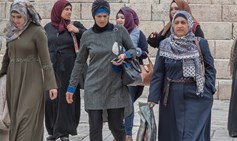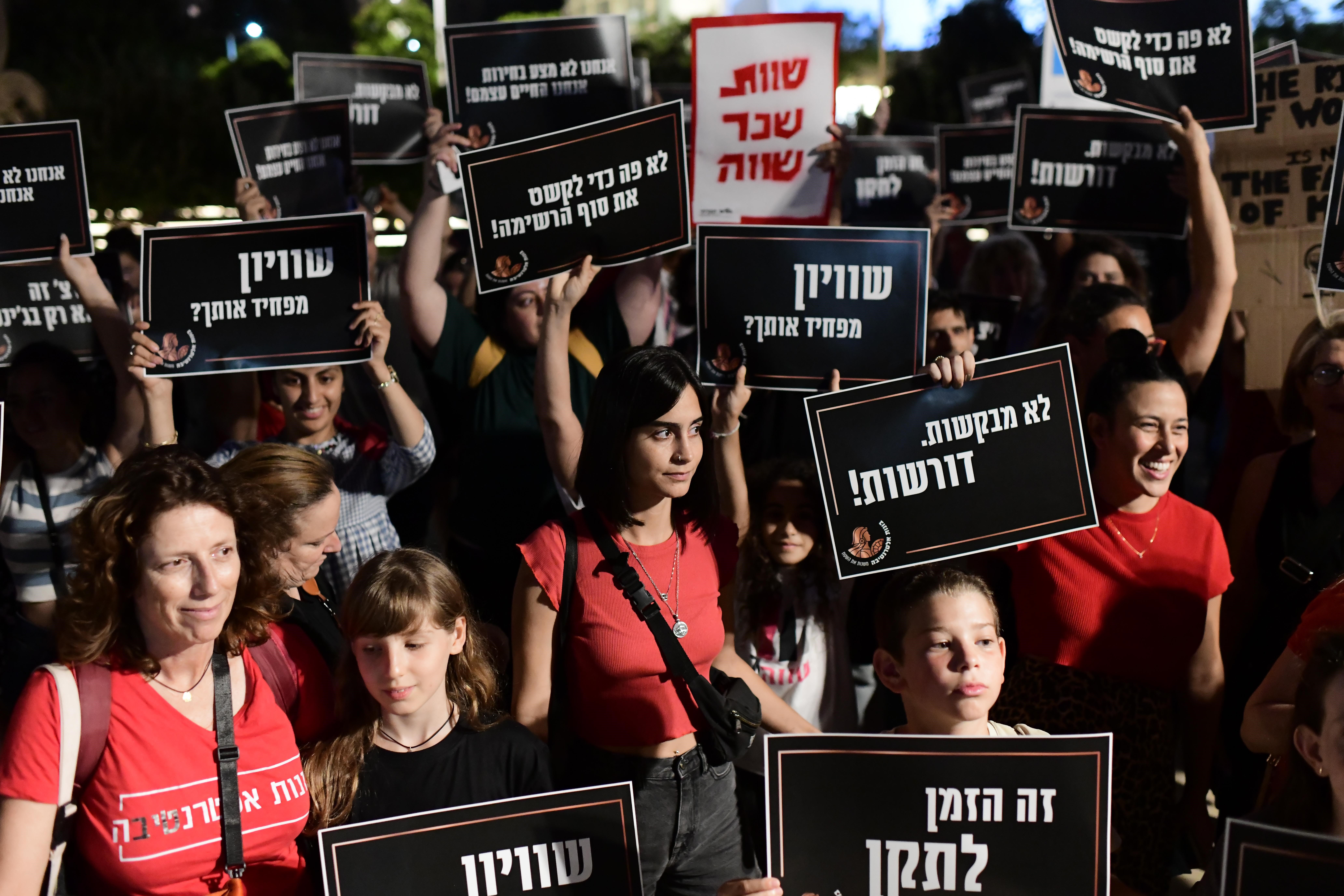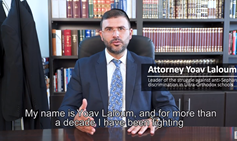

Publications Regarding Judicial Overhaul Implications
Articles

Back Into the Abyss: Israel’s Government Fires Attorney General, Supreme Court Blocks the Move
Written By: Prof. Yuval Shany, Prof. Amichai Cohen
The firing of the AG constitutes another escalation in the current government’s approach to the domestic rule of law institutions.

Dismissing the Attorney General
Written By: Dr. Guy Lurie, Dr. Amir Fuchs
This paper describes the procedure that has been laid out for dismissing the attorney general, its recent revision, and explains why the decision by the Netanyahu government to fire the attorney general at the current time is legally invalid.

Politicization of the Shin Bet is Dangerous to Israel's Security and the Rights of Israelis
Written By: Dr. Eran Shamir-Borer, Prof. Amichai Cohen
Maintaining the Shin Bet’s independence from political influence is essential to preserving both Israel’s national security and the democratic rights of its citizens.

Key points to keep in mind in relation to the Supreme Court hearing on Ronen Bar's firing
Written By: Prof. Suzie Navot
IDI VP of Research Prof. Suzie Navot shares key points to keep in mind in relation to the Supreme Court hearing on Ronen Bar's firing.

Arab Representation in the Judiciary is Under Threat
Written By: Adv. Lital Piller
By shifting power from professional bodies to political appointees the new law restructuring the Judicial Selection Committee is likely to reduce Arab representation and exacerbate their exclusion.

The Government Against the Rule of Law
Written By: Dr. Guy Lurie
The Israeli government's current efforts to dismiss the head of the director of the Shin Bet and the Attorney General, alongside its attempt to restructure the Judicial Selection Committee, reflect a broader shift toward subordinating legal and security institutions to political authority, raising concerns about the erosion of the rule of law and the future of democratic governance in Israel.

Explainer: The Prime Minister’s Decision to Pursue the Dismissal of the Head of the Shin Bet
Written By: Prof. Amichai Cohen, Dr. Eran Shamir-Borer
On March 20, 2025, Israel’s government voted in favor of Prime Minister Benjamin Netanyahu’s decision to dismiss Ronen Bar, head of the Shin Bet, citing "growing distrust" in the security chief. The following document answers key legal questions around this announcement.

Four Comments on the Decision to Dismiss the Head of the Shin Bet
Written By: Prof. Suzie Navot
On March 16, 2025, Prime Minister Netanyahu announced his intention to bring the dismissal of Ronen Bar, the head of the Israeli Security Agency (Shin Bet), Israel's internal security service, to a vote of the full cabinet. Though not a perfect comparison, the Shin Bet is often seen as comparable to the FBI in the US.

Israel’s Renewed Judicial Overhaul
Written By: Prof. Yuval Shany, Prof. Amichai Cohen
The battle over Israel’s legal system has resumed, threatening judicial independence.

Justice Minister: Won't Cooperate with New Supreme Court President | Dr. Guy Lurie on Kan English Podcast
Written By: Dr. Guy Lurie
Dr. Guy Lurie, Senior Researcher at the Israel Democracy Institute, speaks to KAN reporter Naomi Segal following the election of Justice Isaac Amit to Chief Justice and the Minister of Justice's statement that he does not recognize the appointment and will not cooperate with him.

A Chief Justice Under Attack
Written By: Prof. Suzie Navot
While the selection of Justice Amit as President of the Supreme Court was done in accordance with the relevant legislation, the Justice Minister has declared the procedure "fundamentally improper and illegal." His refusal to recognize the selection creates a precedent that may lead to the deterioration of the authority of other institutions. This is what the beginning of a constitutional crisis looks like.

What is the Significance of the Justice Minister’s Declaration that he Will Not Cooperate with the President of the Supreme Court?
Written By: Dr. Guy Lurie
The lack of cooperation between the Minister of Justice and the President of the Supreme Court has numerous consequences that will, among other things, harm the services provided by the judiciary to the citizens of Israel.

A Legitimate Supreme Court President
Written By: Dr. Guy Lurie
Following Justice Isaac Amit's selection as Supreme Court President, Minister of Justice Levin immediately declared he would refrain from any collaboration between them, describing the selection process as unlawful. This announcement is both factually incorrect and a serious dereliction of his duties.

Ministers Levin and Saar's Proposed Changes to the Judicial Selection Committee
Written By: Dr. Guy Lurie
Justice Minister Yariv Levin and Foreign Minister Gideon Sa’ar presented their proposed changes to the composition of the Judicial Selection Committee (JSC) as a compromise aimed at achieving a gradual change in the judicial selection process, but many constitutional experts worry that the plan will have dire consequences resulting in the politicization of Israel’s judicial selection process.

The Politicization Revolution in Judicial Selection
Written By: Dr. Guy Lurie
The Sa'ar-Levin proposal represents a shift from prioritizing professional qualifications in the Judicial Selection Committee to emphasizing political loyalty as the basis for judicial appointments. This risks eroding judicial independence, compromising professionalism, and incentivizing ideological extremism.

“Democracy on the Frontlines” Conference Survey
Written By: The Israel Democracy Institute
Only a small minority of the Israeli public (8%) think that the judicial overhaul should be the government’s highest priority today; The majority of respondents (53%) support keeping the current structure of the Judicial Selection Committee. Only around a quarter (27%) suppor adding politicians to the Committee.

IDI Experts on the New Levin-Saar Proposal to Change the Judicial Selection Committee
Written By: Israel Democracy Institute
In a statement following publication of the new initiative released by Minister of Justice Yariv Levin and Foreign Minister Gideon Saar, IDI experts weigh in on the new proposal to change the Judicial Selection Committee.

The ICC Palestine Case in the Aftermath of the Arrest Warrants Decisions – Part Two
Written By: Prof. Yuval Shany, Prof. Amichai Cohen
In the second installment of their two-part analysis of the ICC's decision to issue arrest warrants against Israeli leaders, Prof. Yuval Shany and Prof. Amichai Cohen examine the arguments behind the arrest warrants and steps Israel can take to prevent them from being realized.

New Bill Proposed Expands the Criteria for Disqualification of Electoral Lists
Written By: Dr. Amir Fuchs
A new bill proposes to amend Basic Law: The Knesset, by expanding the criteria that would disqualify candidates and lists from participating in elections based on minimal and even past expressions, interpreted as sympathy or support for armed struggle of an enemy state or terrorist organization.

Conversations with Cosgrove: Israel's Democracy with Yohanan Plesner
Written By: Yohanan Plesner
Rabbi Cosgrove discusses the current political climate in Israel with Yohanan Plesner.

The Role of the Attorney General and Government Conduct
Written By: Dr. Guy Lurie, Adv. Anat Thon Ashkenazy, Adv. Daphne Benvenisty
In recent days the Attorney General has issued several warnings that decisions are being made using "flawed work processes." This explainer provides an overview of the role and importance of the Attorney General in Israeli democracy, and the current criticism directed by the AG at the government.

Judicial Selection in Israel in the Aftermath of the Judicial Overhaul
Written By: Dr. Guy Lurie
With the outbreak of the war in October 2024, the Prime Minister announced that he was halting all legislation relating to the judicial overhaul, however, various government actions raise questions regarding its intentions in relation to the overhaul and whether it might be trying to advance it by other means beyond legislation.

The United Nations’ Warning about Undermining the Independence of the Judiciary
Written By: Dr. Guy Lurie
The UN report paints a disturbing picture in which countries experience “autocratization”—an erosion of the foundations of democracy—through actions that undermine the judicial system’s independence. In Israel, the current government is aiming to undermine judicial independence in order to consolidate its power and authority at the expense of individual rights and the rule of law.

The Judicial Overhaul and Anti-Democratic Initiatives - Part II
Written By: Adv. Anat Thon Ashkenazy, Adv. Daphne Benvenisty
IDI experts outline the initiatives and measures undertaken by the government that, taken together, constitute a concentrated effort undermine Israel's democratic institutions. At the core of these efforts is a dramatic attempt to weaken the status of the Attorney General; increased politicization of the police; continued undermining of the independence of the judiciary and more.

“Unity” as a Means to Weaken the Judicial System
Written By: Dr. Guy Lurie
While the Israeli public has been focusing on the war and on the hostages in Gaza, the government—led by the minister of justice—has been preparing an assault on the independence of the judicial system.

The Judicial Overhaul and Anti-Democratic Initiatives
Written By: Adv. Anat Thon Ashkenazy, Adv. Daphne Benvenisty
Judicial overhaul initiatives, along with other anti-democratic measures, have continued to be promoted by the government and the coalition in the Knesset. This document outlines the various actions taken in government that weaken the Israeli judiciary and democracy at large.

The Invisible Safeguards of Judicial Independence in the Israeli Judiciary
Written By: Dr. Guy Lurie
The Israeli democracy regulates the operation of the judiciary through the constraints of formal rules that check the political actors, the individual judges, and the judiciary. Yet beyond these formal rules, informal institutions and practices are sometimes equally important in the operation of the judiciary, as they are in any constitutional system. This article discusses informal institutions that are important in the operation and independence of the Israeli judiciary.

Doing Away with the Standard of Extreme Unreasonableness
Written By: Prof. Amichai Cohen
The coalition has voted to amend Basic Law: The Judiciary and repeal the Standard of Reasonableness used to review government decisions that are deemed to be extremely unreasonable. On September 12th, the Supreme Court will hear petitions against the constitutionality of this move.

Following the Supreme Court Reasonableness Hearing: Where are we Now?
Written By: Yohanan Plesner , Prof. Yuval Shany
Yohanan Plesner, president of IDI and Prof. Yuval Shany, a Senior Fellow at the Center for Democratic Values and Institutions met with reporters to discuss the historic Supreme Court hearing on the repeal of the reasonableness doctrine.

The government must stop the judicial legislation to prevent further damage to the economy
Written By: Prof. Karnit Flug, Prof. Jacob Frenkel
Earlier this year, we published an article warning against the dangers of the judicial reforms, to our regret, many of the negative developments about which we warned at the beginning of the year have already come to pass.

Has the IDF's people's army model collapsed?
Written By: Prof. Amichai Cohen
A volunteer civilian army is possible only when a shared core of social values exists among citizens. But deepening social and political tensions has threatened this system.

The Economic Implications of the Coalition’s Legislative Initiatives
Written By: Prof. Itai Ater, Dr. Tzachi Raz, Dr. Yannay Spitzer
This paper seeks to elucidate the economic consequences of the judicial overhaul. It approaches the topic through the lens of the new institutional literature in economics, which has extensively addressed the link between democratic institutions and the economy in recent decades.

The Day After Reasonableness
Written By: Prof. Suzie Navot
The coalition launched the first stage in its judicial overhaul. The process by which the amendment to the Basic Law: The Judiciary was passed, releasing the government and its ministers from the duty to act with reasonableness, is the best possible evidence for what we can now expect.

The IDF Reservists Protest against the Judicial Overhaul – Explainer
Written By: Dr. Eran Shamir-Borer, Adv. Mirit Lavi
The protest by reserve soldiers has sparked a fierce political and public debate in Israel. Who are these reservists, what are their motivations and what are the implications of their choice? Find the answers here.

In Anticipation of the Knesset’s Vote on the “Reasonableness Standard” – What Happens Next?
Written By: Yohanan Plesner
With the Knesset set to hold its final vote on curtailing the “reasonableness standard,” what happens next? What are the implications of removing this type of oversight on governmental decisions, and is there still a possibility for compromise ahead of the vote?

Not Unreasonable - Irresponsible
Written By: Dr. Guy Lurie
The law is clear. The Minister is obligated to convene the committee when judicial vacancies appear. By evading this responsibility, he is failing in his duty.

Flash Survey: Most Israelis Assess that the Protest Movement Has Delayed Progression of the Judicial Overhaul
Written By: Prof. Tamar Hermann, Dr. Or Anabi
Almost a quarter of Israelis have participated in some form of protest, a majority assess that the protest movement has delayed the progress of the judicial overhaul and Likud voters are divided on the question of continuing its implementation.

The Reasonableness Issue Requires Serious, Informed, and Consensual Discussion
Written By: Prof. Suzie Navot
Only a government that wishes to make extremist and corrupt decisions would be afraid of the reasonableness test. While the test would certainly benefit from discussion of the framing of its boundaries and application, the legislation currently on the table hands the government unrestrained power.

No professionalism, no expertise – and no women
Written By: Adv. Anat Thon Ashkenazy
The Authority for the Advancement of Women's Status and agencies like it are being gutted along with protections for women

Massive Protests Show Israelis Understand Democracies Die Gradually
Written By: Dr. Nadiv Mordechay,
In Israel, the equivalent of 70 million Americans have gone out to protest the Netanyahu government's attempt to break the country's constitutional order. Populist politics is at war with the mainstream public opinion that it claims to represent.

Constitutional Reform in Israel - How should it be done?
Written By: Yohanan Plesner
President of IDI, Yohanan Plesner, describes the judicial reforms that would make Israeli democracy stronger and transform a moment of crisis into an historical constitutional opportunity.

The Judicial Revolution and Arab Society in Israel
Written By: Adv. Oded Ron, Dr. Muhammed Khalaily
Reducing the possibility of invalidating legislation and the rest of the initiatives will further undermine the protection of the rights of the Arab minority in Israel, whose trust in the judicial system has steadily decreased in recent years - but is still high in relation to trust in other institutions.

The Ramifications of the Judicial Reform for the Status of Women in Israel
Written By: Adv. Anat Thon Ashkenazy
A professional opinion by the Israel Democracy Institute presented in advance of the session of the Knesset Committee on the Status of Women and Gender Equality on February 20, 2023

The Judicial Reforms Implications on Israel's Standing in the International Courts
Written By: Prof. Yuval Shany
The Israeli judicial system’s independence and professionalism protect IDF commanders from prosecution in international courts. A close look at the planned judicial overhaul leads to the conclusion that if implemented it would increase the risk to Israeli citizens and make it harder for the country to protect them in the future.

Death Penalty for Terrorists Bill is Not Constitutional and Will Deal Grievous Harm to Israel
Written By: Prof. Yuval Shany, Prof. Mordechai Kremnitzer, Prof. Amichai Cohen, Dr. Amir Fuchs
Israel has only used capital punishment twice, with the last time being in 1962 when Nazi war criminal Adolf Eichman was put to death. IDI experts weigh in on a bill that would make capital punishment mandatory for convicted terrorists.

Israel Heading Toward a Silenced, Paralyzed Society
Written By: Adv. Anat Thon Ashkenazy, Prof. Michal Almog-Bar
The blow would be hardest for organizations whose role is to defend vulnerable groups, including; those living below the poverty line, the elderly, women, and people with disabilities.

The Override Clause and Special Needs Children
Written By: Ilil Leder
Ilil Leder, relates how she was able to achieve equality in education for her daughter and all special needs children with the help of the High Court of Justice

The Override Clause and Equality in Schools
Written By: Attorney Yoav Laloum
Attorney Yoav Laloum relates how by petitioning the High Court of Justice he was able to stop ethnic separation in ultra-Orthodox educational institutions

The Override Clause and Gender Equality in the IDF
Written By: Alice Miller
Alice Miller describes how the High Court of Justice helped change women’s military service and improve gender equality in the IDF

The Levin-Sa’ar Plan: Don’t Slam the Door on Someone Looking for a Way Out of Their Own Mess
Written By: Prof. Benjamin Porat
The Levin-Saar plan abandons key elements of his earlier judicial overhaul, proposing changes to judicial selection and Basic Laws. While flawed, it offers a potential starting point for bipartisan negotiations to resolve Israel’s constitutional crisis.
